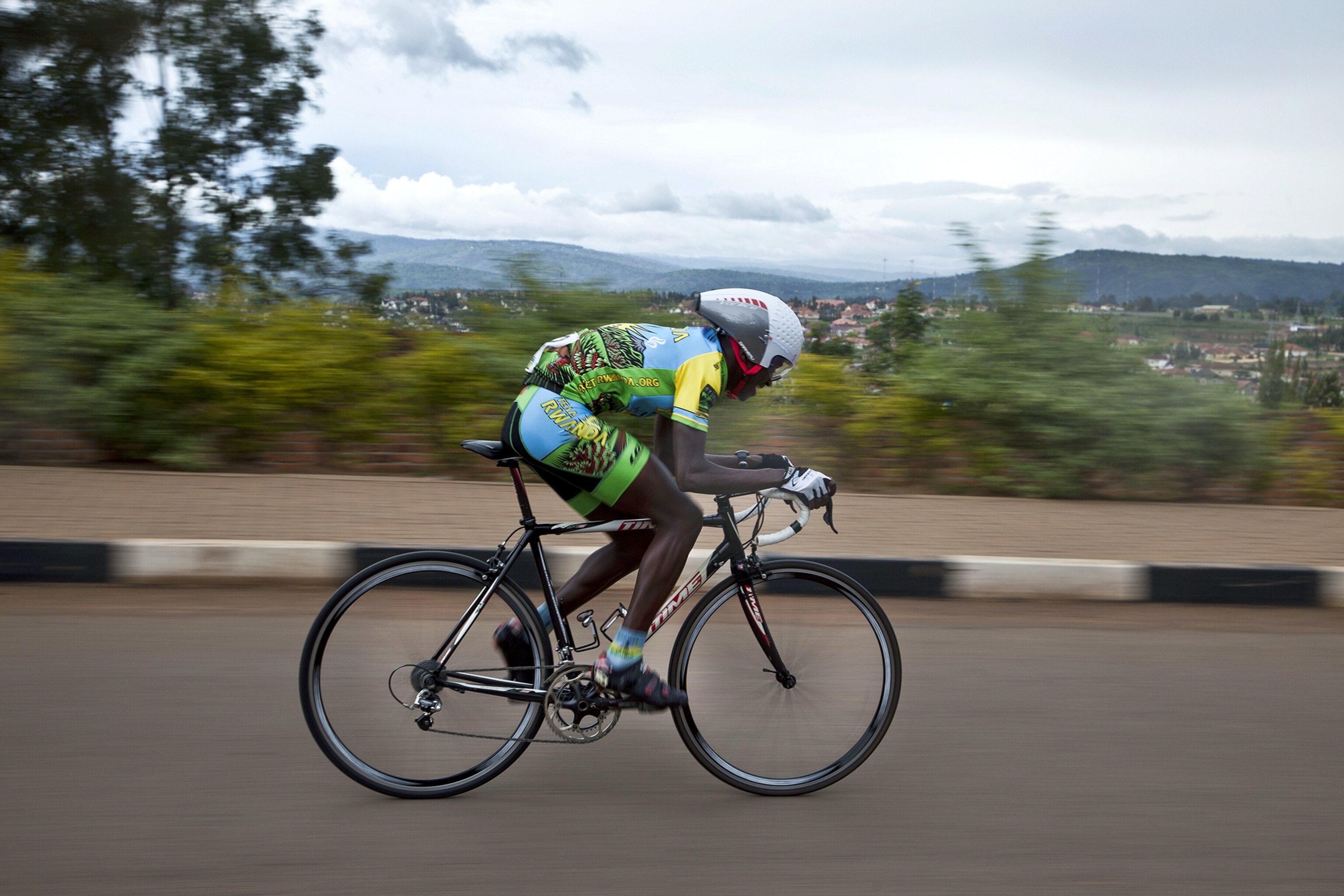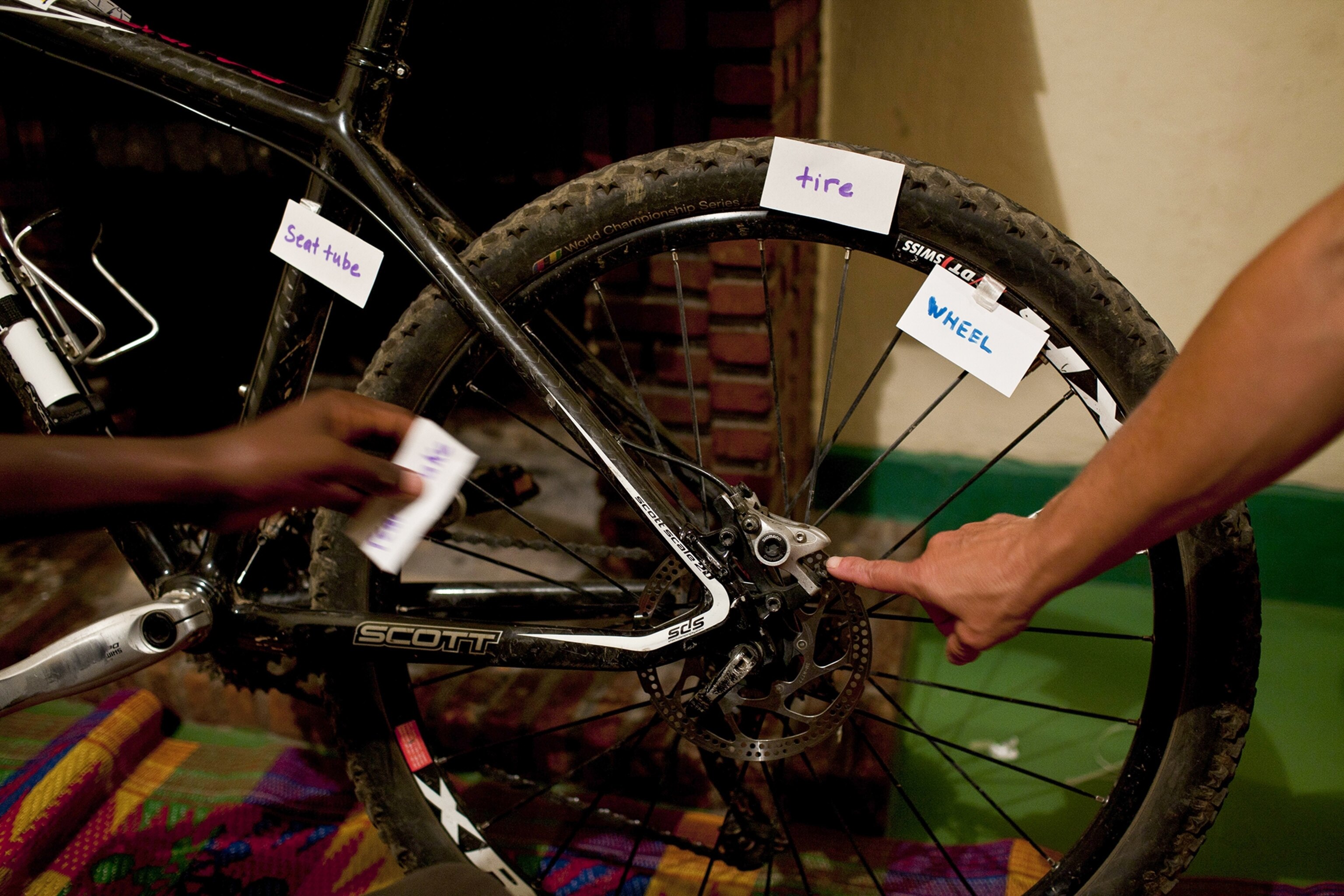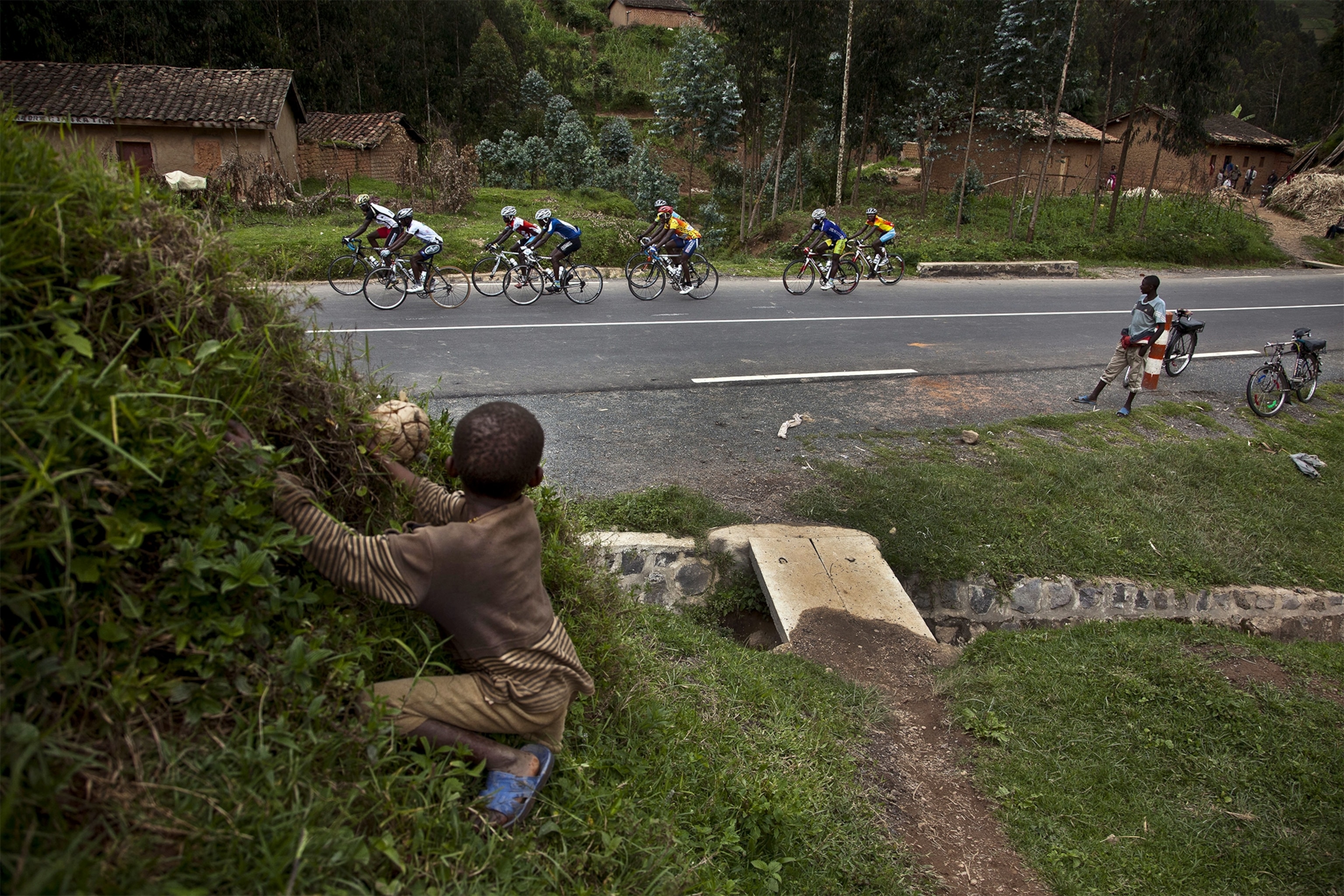
American Coach Combs Africa for Cycling's Next Stars
No black African rider has ever competed in the Tour de France.
When the first-stage winner of this year's Tour de France mounts the podium on Saturday, Bonaventure Uwizeyimana will likely be taking notes from his home in Shashwara, Rwanda.
Uwizeyimana, 21, has an unlikely background for a budding professional cyclist. Born in Rwanda's mountainous northwest, a year before the 1994 genocide, he spent time as a refugee in neighboring Congo, lost his mother during childhood, and endured two surgeries to repair a cleft palate.
In 2008, as a 15-year-old primary school dropout, he began hauling passengers and cargo on a clunky single-speed bicycle. His goal was merely to help his family scrape by.
Today—thanks in part to a 58-year-old American named Jonathan "Jock" Boyer—Uwizeyimana is aiming higher. Since 2012, when he was selected on his third attempt to join Team Rwanda, the national squad launched by Boyer in 2007, Uwizeyimana has developed into one of his country's top cyclists.
This month, he's set to join the France-based Vendée-U, a feeder team for Team Europcar, whose top nine riders will be part of the 2014 Tour de France peloton.
According to Boyer, Uwizeyimana is one of several young African riders with the potential to reach cycling's highest level—trailblazers on a continent that Boyer predicts will soon radically alter the sport's competitive landscape.
"Africa is home to incredible cycling talent," he says. "In some countries we have riders at a pretty high level. It's just a matter of getting them two or three notches up."

Team Rwanda
If there's anyone equipped to drive this African cycling renaissance, it's Boyer.
A pioneer of U.S. cycling, and the first American to compete in the Tour de France, the 58-year-old Californian has spent the past seven years building the sport in Rwanda. It's a country full of talented riders, he says, but it lacked a competitive cycling culture.
With support from several international sponsors, Boyer began in 2007 by recruiting prospects from across the country, testing their ability on a computer-equipped stationary bike known as a Velotron, and offering the most promising riders a tryout and a bike
Starting with an original group of five, Boyer expanded the team as resources allowed and has assembled one of the better national teams on the continent. He's also produced Rwanda's first pro cyclist, Adrien Niyonshuti, who rides with the South Africa-based Team MTN-Qhubeka.
Soon after Boyer's arrival, riders accustomed to a hand-to-mouth existence were traveling to races across Africa, earning money to build homes and support their families. Thirteen years after their country had been torn apart by genocide, Hutu and Tutsi were riding side by side.

A Pan-African Project
After seven years of building Team Rwanda, Boyer has now moved on to the next phase of his project. With a young American, Daniel Matheny, in charge of daily coaching duties, Boyer has shifted focus to the development of Team Africa Rising, a partnership between Rwanda, Ethiopia, and Eritrea to be based at Rwanda's newly inaugurated Africa Rising Cycling Center.
Perched at the edge of the Virunga Mountains, among hilly, lightly trafficked roads ideal for training, the center will serve as the home of Rwandan cycling and a training base for national and pro teams from Africa and beyond.
Among the center's first foreign cyclists will be riders from Ethiopia and Eritrea, Horn of Africa neighbors that, though bitter geopolitical rivals, share a common cycling tradition.
Introduced during the Italian colonial period, cycling has been Eritrea's de facto national sport for a century, and its popularity extends into the neighboring Ethiopian region of Tigray. Although both countries—facing significant financial and logistical challenges—have struggled to turn raw talent into global success, each has excelled in races on the African continent.
Eritrea's top rider, a 23-year-old named Natnael Berhane, has already come close to making history. Although the Tour de France has seen several Algerian, Moroccan, and white South African riders, and counts Chris Froome, a Kenyan-born, South Africa-raised Brit, as its defending champion, no black African rider has ever competed in cycling's premier event.
Berhane—a member of the Paris-based Team Europcar, and an alumnus of the same Vendée-U feeder squad that Uwizeyimana now rides for—has excelled,winning the 2013 Presidential Cycling Tour of Turkey and the 2014 La Tropicale Amissa Bongo in Gabon. Although he was not named to Europcar's nine-man 2014 Tour de France roster, chances are high that he will make the squad in coming years.

Breaking Barriers
Although the continent is not there yet, Boyer is convinced that the era of African cycling dominance is not far off.
In a sport with physiological demands similar to those of distance running—long an East African specialty—Boyer believes the rise of African riders is largely a function of finances. Unlike running, which requires little investment, elite-level cycling demands expensive bicycles, well-trained mechanics, and a technical knowledge that takes time to master—particularly among riders who have little formal education, including most members of Team Rwanda.
According to Boyer, the Africa Rising venture will facilitate the flow of resources to all three countries, resulting in improved facilities, coaching, and equipment. Eventually, he envisions a Rwanda-based continental pro team that will fast-track African success on the roads while helping to build continental unity.
After his experience in post-genocide Rwanda, Boyer is convinced of the power of sports for conflict resolution and reconciliation—a notion he now seeks to apply to Ethiopia and Eritrea, states that remain bitter enemies 14 years after a war along their border killed an estimated 100,000.

According to Geda Worku, president of the Ethiopian Cycling Federation, Eritrean and Ethiopian riders—most of whom share the common language of Tigrigna—already mingle at competitions and enjoy a camaraderie that transcends politics. Boyer hopes to extend this collaboration by engaging the riders in joint training and even—if authorities permit—arranging a race that crosses the long-closed Eritrea-Ethiopia border.
"Politically [the opening of the border] is almost impossible," Worku says, "but through sports it probably is possible."
Even if this goal proves too lofty, Boyer says, he's confident the sport—in addition to minting champions—will continue to transform the lives of his young riders.
"Before I was having nothing," Uwizeyimana, speaking in English, says of the days before he took up cycling.
"Now I have some small money. I have a house. Cycling has changed very, very much my life."
Jon Rosen is a freelance journalist based in Kigali, Rwanda. Last month he profiled "The Battle for Africa's Oldest National Park."